外研版七年级上册重点短语和句子
七年级上英语外研知识点归纳总结
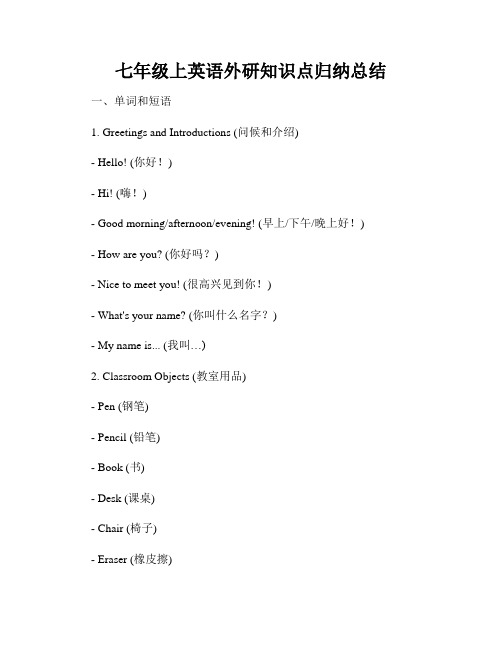
七年级上英语外研知识点归纳总结一、单词和短语1. Greetings and Introductions (问候和介绍)- Hello! (你好!)- Hi! (嗨!)- Good morning/afternoon/evening! (早上/下午/晚上好!)- How are you? (你好吗?)- Nice to meet you! (很高兴见到你!)- What's your name? (你叫什么名字?)- My name is... (我叫…)2. Classroom Objects (教室用品)- Pen (钢笔)- Pencil (铅笔)- Book (书)- Desk (课桌)- Chair (椅子)- Eraser (橡皮擦)- Ruler (尺子)- Bag (书包)3. Numbers (数字)- Zero (零)- One (一)- Two (二)- Three (三)- Four (四)- Five (五)- Six (六)- Seven (七)- Eight (八)- Nine (九)- Ten (十)4. Days of the Week (星期) - Monday (星期一)- Tuesday (星期二)- Wednesday (星期三)- Thursday (星期四)- Friday (星期五)- Saturday (星期六)- Sunday (星期日)5. Family Members (家庭成员) - Mother (妈妈)- Father (爸爸)- Brother (哥哥/弟弟)- Sister (姐姐/妹妹)6. Colors (颜色)- Red (红色)- Blue (蓝色)- Yellow (黄色)- Green (绿色)- Orange (橙色)- Purple (紫色)- Black (黑色)- White (白色)二、语法知识点1. 一般现在时- 表示经常性或习惯性的动作或状态。
外研版初一 (七年级)上册英语各单元重点句型全汇总

外研版初一 (七年级)上册英语各单元重点句型全汇总【重点句子】1.I’m Chinese ,and I’m fromChina.我是中国人, 我来自中国(I’m Chinese, and I come fromChina.)2. Where are they from? 他们来自什么哪里?(=Wheredo they come from?)They are from America. 他们来自美国.(=Theycome fromAmerica.)3.How old is that man? 那位男子多少岁了?He isforty-four. 他44岁4. The students are in Class Five, Grade Seven.这些学生在七年级五班5. Tom is in Class One with Lingling. 汤姆和玲玲在一班。
=Tom with Lingling is in ClassOne.=Tom and Lingling are in Class One.6.What about you?=How about you?=And you?你呢?/你怎么样?7.Welcome to Class 6 Grade 7 ! 欢迎到七年级六班。
8. Beijing is the capital ofChina. 北京是中国的首都。
9.Good to see you.=Nice to see you.=Glad to seeyou. 很高兴见到你。
10.I’m Tony Smith.Tony is my first name and Smith is my last name. 我是Tony Smith,Tony是我的名,Smith是我的姓。
【重点句子】1.This is a photo of Tony’s family. 这是Tony的一张全家福。
2.What a big family! 多大的一个家庭啊!3.My mum’s parents are on the right.我母亲的父母在右边4.The woman next to me ismy dad’s sister.紧挨着我的这位女子是我父亲的妹妹。
外研版英语七年级上册复习资料

Module1Module2I.重点短语:I.重点短语:1.befrom...=comefrom...1.来自......1.aphotoofTony’sfamily1.一XTony的家庭的照片2....yearsold2.......岁2.ontheleftof.....2.在......的左边3.whatabout...=howabout...3.......怎么样?3.nextto.....3.紧挨着.....;紧靠......4.inClassTen,GradeSeven4.在七年级十班4.infrontof......4.在......前面〔分开〕5.thecapitalof...5......的首都/省会in/atthefrontof......在......前面〔没有分开〕6.firstname=givenname6.名5.Tony’sparents5.Tony的父母stname=familyname7.姓6.inthephoto6.照片上8.Englishname8.英文名字7.atthebusstation7.在公共车站9.Chinesename9.中文名字8.atapolicestation8.在警察局II.重点句子:9.amanagerofatheater9.一位剧院负责人1.I’mChinese,andI’mfrom1.我是中国人,我来自中国.=atheatermanagerChina.10.amanagerofahotel10.一位宾馆经理(I’mChinese,andIcome2.他们来自什么哪里?=ahotelmanagerfromChina.)11.at/inthesamehospital11.在同一家医院他们来自美国.2.Wherearetheyfrom?12.abusdriver12.一位公共汽车司机(=Wheredotheycome13.afarmworker13.一位农场工人from?)14.ashopworker14.一名店员TheyarefromAmerica.15.anEnglishteacher15.一位英语教师(=TheycomefromII.重点句子:America.)1.ThisisaphotoofTony’s1.这是Tony的一X全家福。
初中英语新外研版七年级上册Unit 1重点句子语言点2(2024秋)

七年级英语上册Unit 1重点句子语言点1.The Students’Union supports students at school.学生会支持学校的学生。
(1)the Students’ Union学生会。
(2)at school在学校。
2.They hold all kinds of activities, such as cultural festivals and sports meets.他们举行各种各样的活动,比如文化节日和体育比赛。
(1)hold all kinds of activities举办各种各样的活动。
(2)such as比如。
【例】There are many kinds of animals in the zoo, such as bears, tigers, monkeys and so on.(3)cultural festivals文化节日。
(4)sports meets体育比赛;体育赛事。
3.They also help students with their problems.他们也帮助学生解决问题。
help sb. with sth.=help sb. do sth.=help sb. to do sth.帮助某人做某事。
【例】Can you help me with the classroom?=Can you help me clean the classroom?=Can you help me to clean the classroom?4.How can they make good use of their time?他们怎样才能充分利用他们的时间?make good use of... 充分利用......。
【例】We should make good use of our time to study hard every day.5.There is a lot of homework today.今天有很多作业。
七年级上册外研版英语重点句子短语
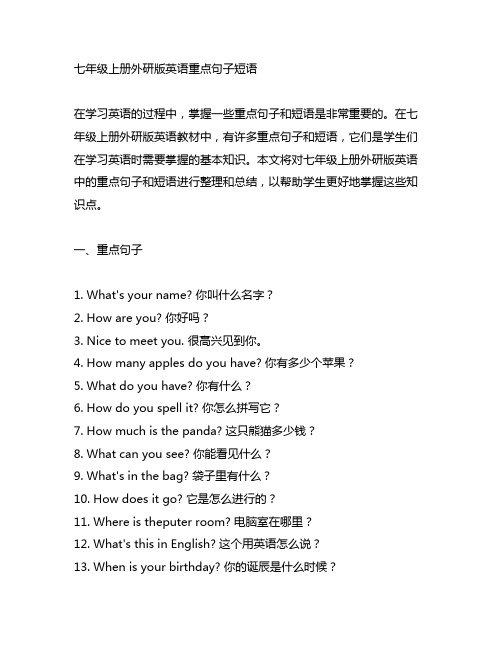
七年级上册外研版英语重点句子短语在学习英语的过程中,掌握一些重点句子和短语是非常重要的。
在七年级上册外研版英语教材中,有许多重点句子和短语,它们是学生们在学习英语时需要掌握的基本知识。
本文将对七年级上册外研版英语中的重点句子和短语进行整理和总结,以帮助学生更好地掌握这些知识点。
一、重点句子1. What's your name? 你叫什么名字?2. How are you? 你好吗?3. Nice to meet you. 很高兴见到你。
4. How many apples do you have? 你有多少个苹果?5. What do you have? 你有什么?6. How do you spell it? 你怎么拼写它?7. How much is the panda? 这只熊猫多少钱?8. What can you see? 你能看见什么?9. What's in the bag? 袋子里有什么?10. How does it go? 它是怎么进行的?11. Where is theputer room? 电脑室在哪里?12. What's this in English? 这个用英语怎么说?13. When is your birthday? 你的诞辰是什么时候?14. I like English. 我喜欢英语。
15. Can I help you? 我能帮你吗?16. Can I have some milk? 我能喝点牛奶吗?17. Do you have a music room? 你有音乐室吗?18. How many students are there in the school? 学校有多少学生?19. Is this your room? 这是你的房间吗?20. Thank you very much. 非常感谢你。
二、重点短语1. Good morning! 早上好!2. Good night! 晚安!3. in Chinese 用中文4. at five o'clock 在五点5. look at 看6. have a look 看一看7. be quiet 安静8. like English 喜欢英语9. Thank you 谢谢10. How much 多少钱11. Can I help you? 我能帮你吗?12. have some tea 喝点茶13. a map of China 一份我国地图14. on the wall 在墙上15. at the zoo 在动物园16. go to the zoo 去动物园17. very much 非常18. in the box 在盒子里19. see you later 稍后见20. have a good time 玩得开心以上就是七年级上册外研版英语的一些重点句子和短语。
外研版七年级上册英语重点短语及句子 整理

外研版七年级上册英语重点短语及句子整理is my last name.我叫___。
___是我的名字,___是我的姓。
My name is Tony Smith。
Tony is my first name and Smith is my last name.Module 2重点短语1.be ___。
感兴趣2.be good at。
擅长于。
3.___。
有。
的天赋4.dream of/about。
梦想。
5.go to college上大学6.study abroad在国外研究7.___。
毕业于。
8.major in。
主修。
9.take part in。
参加。
10.win the first prize获得一等奖重点句子1.What are you interested in?你对什么感兴趣?2.I’m good ___.我擅长打篮球。
3.___.她有唱歌的天赋。
4.I dream of ___.我梦想成为一名医生。
5.He wants to go to college in the United States. 他想去美国上大学。
6.___.她在澳大利亚留学。
7.___.他毕业于___。
8.I’m majoring in English.我主修英语。
9.I want to take part in the school music festival. 我想参加学校的音乐节。
10.She won the first prize in the English ___.她在英语演讲比赛中获得了一等奖。
I am Tony Smith。
Tony is my first name and Smith is my last name。
In terms of basic grammar。
we will cover the use of the verb "to be" and basic sentence structure。
2024外研版英语七年级上册复习知识点汇总

七年级上Revision of Starter 一、重点短语sit down坐下stand up站起来how old多大after school/class放学后/下课后listen to music听音乐welcome to+地点欢迎来某地in English用英语say that again再说一遍of course当然what color什么颜色eve,yday life每天的生活good idea好主意how many/how much多少thank you/thanks谢谢put up sb's hand举起某人的手telephone number电话号码write it on the blackboard把它写在黑板上play basketball/football打篮球/踢足球in Class Five Grade One在一年级五班see you tomorrow明天见go swimming去游泳m+国家/城市等在国家/城市等at+车站/学校/家等在车站/学校/家等sb's favorite sport/color某人最喜欢的运动/颜色good morning/afternoon/evening早上好/下午好/晚上好二、重点句型l---\邓at's your name, please? 请问你叫什么名字?---I'm/My mane's... 我叫.2.---How are you ? 你好吗?---F ine,thanks.很好,谢谢……..in spring/summer/autumn/winter在春/夏/秋/冬等3.---This is my friend/teacher, and his/her name is/he is...这是我的朋友/老师,他的名字是.4.---I t's time to go now. Goodbye.现在该走了,再见。
外研版七年级英语上册初中知识点归纳总结(暑假预习必备)

外研版七年级英语上册初中知识点归纳总结(暑假预习必备)Module 1一、重点短语1.be from... =come from... 来自......2....years old ......岁3.what about... =how about... ......怎么样?4.in Class Ten, Grade Seven在七年级十班5.the capital of... ...... 的首都/省会6.first name =given name 名st name=family name 姓8.English name 英文名字9.Chinese name 中文名字二、重点句子1.I’m Chinese ,and I’m fromChina.我是中国人,我来自中国(I’m Chinese, and I come fromChina.)2. Where are they from?他们来自哪里?(=Wheredo they come from?)They are from America.他们来自美国.(=Theycome fromAmerica.)3.How old is that man?那位男子多少岁了?He isforty-four.他44岁4. The students are in Class Five, Grade Seven.这些学生在七年级五班5. Tom is in Class One with Lingling.汤姆和玲玲在一班。
=Tom with Lingling is in ClassOne.=Tom and Lingling are in Class One.6.What about you?=How about you?=And you?你呢?/你怎么样?7.Welcome to Class 6 Grade 7 !欢迎到七年级六班。
8. Beijing is the capital ofChina.北京是中国的首都。
外研版七年级上册英语重点短语及句子

外研版七年级上册英语重点短语及句子一、重点短语1. say hello to意思:向…打招呼例句:I saw my friend on the street and said hello to him.2. go to school意思:去上学例句:What time do you usually go to school in the morning?3. have breakfast/lunch/dinner意思:吃早餐/午餐/晚餐例句:I usually have breakfast at home before going to school.4. in the morning/afternoon/evening意思:在早上/下午/晚上例句:My English class is in the morning, and my math class is in the afternoon.5. have a good time意思:玩得开心,过得愉快例句:We went to the park on Sunday and had a good time. 6. play sports/games意思:进行体育运动/玩游戏例句:I like to play basketball with my friends after school. 7. do homework意思:做作业例句:Don’t forget to do your English homework tonight.8. watch TV意思:看电视例句:After dinner, I usually watch TV with my family.9. go shopping意思:购物例句:My sister and I went shopping at the mall last weekend.10. get up意思:起床例句:I usually get up at 7 o’clock in the morning.二、重点句子1. What’s your name?意思:你叫什么名字?例句:A: Hi, what’s your name?B: My name is Lisa. Nice to meet you.2. How are you?意思:你好吗?例句:A: How are you, Tom?B: I'm fine, thank you.3. What time is it?意思:现在几点钟?例句:A: Excuse me, sir. What time is it?B: It's 9:30.4. Where are you from?意思:你来自哪里?例句:A: Where are you from, Lucy?B: I'm from China.A: Nice to meet you, Lucy.5. How old are you?意思:你多大了?例句:A: How old are you, Jack?B: I'm 13 years old.6. Can I help you?意思:我可以帮助你吗?例句:A: Can I help you, sir?B: Yes, I'm looking for a blue T-shirt.7. What’s this in English/Chinese?意思:这个用英语/中文怎么说?例句:A: What’s this in English?B: It's a book.8. May I go to the bathroom, please? 意思:我可以去洗手间吗?例句:A: May I go to the bathroom, please? B: Sure, you can go now.9. How do you spell it?意思:你怎么拼写它?例句:A: Excuse me, how do you spell。
Unit 1 A new start --课文知识讲解(重点短语+句子解析)

外研版七年级上册新教材(讲义)Unit 1 A new start重点短语on the blackboard 在黑板上write down 记下start to do 开始做the first 第一个point out 指出...in the first lesson 在第一节课jump into my mind 跳进我的脑海look up at 抬头看think about 思考,想想看put up my hand 举起手来There is a mistake. 有一个错误。
Confucius 孔子Mencius 孟子well done 做得不错in fact 事实上all of you 你们所有人junior high school 初中more difficult 难度更大It’s important to do做某事这是很重要的the main idea of the passage 该文章的中心思想learn from 向…学习make mistakes 犯错it’s important for sb. to do sth. 某人做事很重要。
come into 进入ask sb. to do sth 要求某人做些什么how about …怎么样fell so nervous 非常紧张地gave a silly answer 给出了一个愚蠢的答案turn red 变红with a smile 微笑着(脸上带着)make sb.+ adj. 让某人怎么样了the students' union 学生联合会at school 在学校all kinds of activities 各种活动such as 比如cultural festivals 文化节日sports meets 体育比赛sometimes 有时need to 需要describe our problems 描述我们的问题state our problems 说明我们的问题for example 例如It's hard to do sth. 这是很困难的去做......give sb. some advice 给某人一些建议the first 最先a piece of advice 一条建议the second 第二个look at 看look up 向上看/ 查阅(字典)by yourself 单独地、靠你自己problem 问题try your best 尽你所能work hard 努力工作read the passage 标题的含义find out 发现the meaning of the title 读这篇文章Do you remember...? 你还记得......吗?your sixth birthday 你的六岁生日made a paper boat 做了一艘纸船in the pool 在池中sail away 远航look at 查看It's a letter from sb. 这是某人的一封信。
外研版七年级英语上册词组归纳(1)
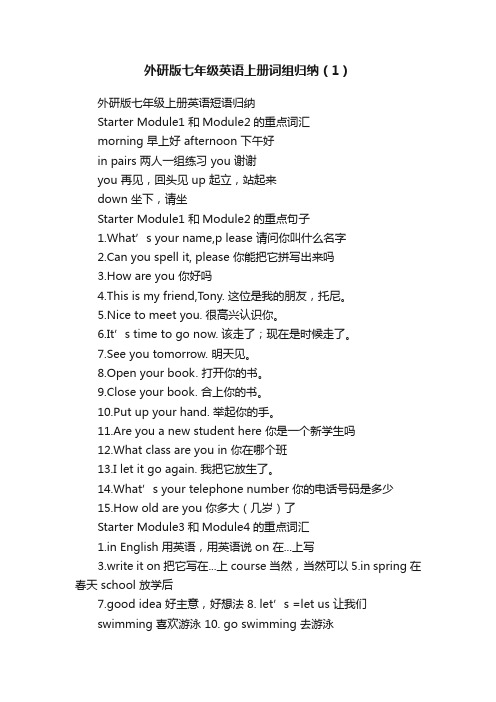
外研版七年级英语上册词组归纳(1)外研版七年级上册英语短语归纳Starter Module1 和Module2的重点词汇morning 早上好 afternoon 下午好in pairs 两人一组练习 you 谢谢you 再见,回头见 up 起立,站起来down 坐下,请坐Starter Module1 和Module2的重点句子1.What’s your name,p lease 请问你叫什么名字2.Can you spell it, please 你能把它拼写出来吗3.How are you 你好吗4.This is my friend,Tony. 这位是我的朋友,托尼。
5.Nice to meet you. 很高兴认识你。
6.It’s time to go now. 该走了;现在是时候走了。
7.See you tomorrow. 明天见。
8.Open your book. 打开你的书。
9.Close your book. 合上你的书。
10.Put up your hand. 举起你的手。
11.Are you a new student here 你是一个新学生吗12.What class are you in 你在哪个班13.I let it go again. 我把它放生了。
14.What’s your telephone number 你的电话号码是多少15.How old are you 你多大(几岁)了Starter Module3和Module4的重点词汇1.in English 用英语,用英语说 on 在...上写3.write it on 把它写在...上 course 当然,当然可以5.in spring 在春天 school 放学后7.good idea 好主意,好想法8. let’s =let us 让我们swimming 喜欢游泳 10. go swimming 去游泳Starter Module3 和Module4的重点句子1.What’s this in English 这个用英语怎么说2.Write it on the blackboard, please. 请把它写在黑板上。
最新外研版七年级英语(上册)词组归纳
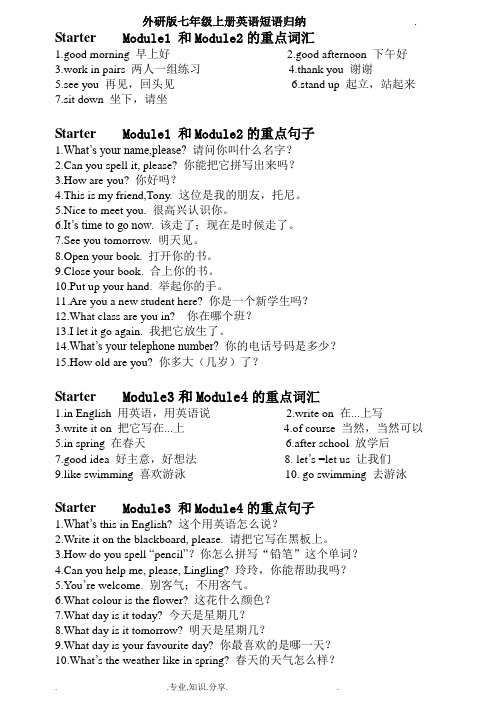
Starter Module1 和Module2的重点词汇1.good morning 早上好2.good afternoon 下午好3.work in pairs 两人一组练习4.thank you 谢谢5.see you 再见,回头见6.stand up 起立,站起来7.sit down 坐下,请坐Starter Module1 和Module2的重点句子1.What’s your name,please? 请问你叫什么名字?2.Can you spell it, please? 你能把它拼写出来吗?3.How are you? 你好吗?4.This is my friend,Tony. 这位是我的朋友,托尼。
5.Nice to meet you. 很高兴认识你。
6.It’s time to go now. 该走了;现在是时候走了。
7.See you tomorrow. 明天见。
8.Open your book. 打开你的书。
9.Close your book. 合上你的书。
10.Put up your hand. 举起你的手。
11.Are you a new student here? 你是一个新学生吗?12.What class are you in? 你在哪个班?13.I let it go again. 我把它放生了。
14.What’s your telephone number? 你的电话号码是多少?15.How old are you? 你多大(几岁)了?Starter Module3和Module4的重点词汇1.in English 用英语,用英语说2.write on 在...上写3.write it on 把它写在...上4.of course 当然,当然可以5.in spring 在春天6.after school 放学后7.good idea 好主意,好想法8. let’s =let us 让我们9.like swimming 喜欢游泳10. go swimming 去游泳Starter Module3 和Module4的重点句子1.What’s this in English? 这个用英语怎么说?2.Write it on the blackboard, please. 请把它写在黑板上。
外研版七年级上册英语重点短语及句子

外研版七年级上册英语知识点Module 1重点短语1.be from... =come from... 来自......2....years old ......岁3.what about... =how about.........怎么样?4.in Class Ten, Grade Seven 在七年级十班5.the capital of... ...... 的首都/省会6.first name =given name 名st name=family name 姓8.English name 英文名字9.Chinese name 中文名字重点句子1.I’m Chinese ,and I’m fromChina.我是中国人, 我来自中国(I’m Chinese, and I come fromChina.)2. Where are they from? 他们来自什么哪里? (=Wheredo they come from?)They are from America. 他们来自美国.(=Theycome fromAmerica.)3.How old is that man? 那位男子多少岁了?He isforty-four. 他44岁4. The students are in Class Five, Grade Seven.这些学生在七年级五班5.Tom is in Class One with Lingling.汤姆和玲玲在一班。
=Tom with Lingling is in ClassOne.=Tom and Lingling are in Class One.6.What about you?=How about you?=And you?你呢?/你怎么样?7.Welcome to Class 6 Grade 7 !欢迎到七年级六班。
8. Beijing is the capital ofChina.北京是中国的首都。
外研版(新)英语七年级上册重点短语与句子课件(PPT68张)
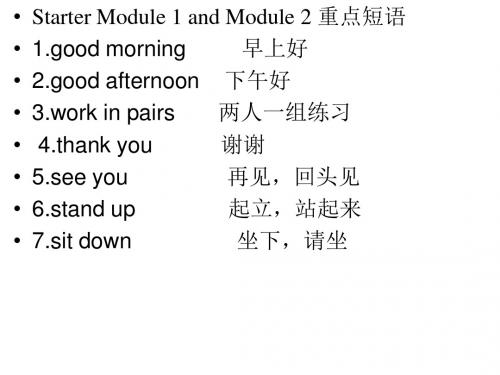
Starter Module 1 and Module 2 重点短语 1.good morning 早上好 2.good afternoon 下午好 3.work in pairs 两人一组练习 4.thank you 谢谢 5.see you 再见,回头见 6.stand up 起立,站起来 7.sit down 坐下,请坐
• • • • • • • • • •
Module 1 1.be from... =come from... 2....years old 3.what about... =how about... 4.in Class Three, Grade Seven 5.the capital of... 6.first name =given name st name=family name 8.English name 9.Chinese name
• Starter Module 1 and Module 2 重点句子
• • • • 10. Put up your hand. 举起你的手。 11. Are you a new student here? 你是一个新学 生吗? 12. What class are you in? 你在哪个班? 13. What’s your telephone number? 你的电话号 码是多少? 14. How old are you? 你多大(几岁)了?
•
• • • • • • • • • •
Starter Module 3 and Module 4 重点短语 1. in English 用英语,用英语说 2.write on 在...上写 3.of course 当然,当然可以 4.in spring 在春天 5.after school 放学后 6.good idea 好主意,好想法 7. let’s =let us 让我们 8.like swimming 喜欢游泳 9. go swimming 去游泳
新外研版七年级上册Module 3 重点短语句子
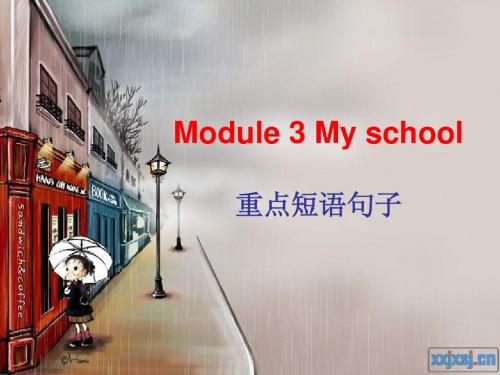
• • • • •
III.基本语法点: 1. There be句型 2. 表方位的介词短语及用法 3. 注意There be 和have/has got 的区别 4. 数词的表达
• • • • • • • • •
9.a science lab 一个科学实验室 10.a sports hall 一个体育馆 11.an office building 一幢办公楼 12.a classroom building 一幢教学大楼 13.in the science building 在科学楼里 14.five computer rooms 五个计算机室 15.in the middle of...... 在......的中间 16.on the left of...... 在......的左边 17.between the library and the dining hall 在图书馆和食堂之间 • 18.be for....... 用于......; 为......准备的
Module 3 My school
重点短语句子
• I.重点短语: 1.a lot of furniture 大量的教学设施;大量的家具 2.on everyone’s desk 在每个人的课桌上 on the teacher’s desk 在讲桌上 3.on the wall 在墙上 4.at/in the front of...... 在.....前面(在范围内) 5.a map of the world 一张世界地图 a map of China 一张中国地图 6.in the dining hall 在食堂里 7.at the school gate 在校门口 8.on/in the p• 1.What’s your classroom like?你的教室怎样? It’s really big. 它真的很大 • 2.How many students are there in your class? 你班上有多少学生? There are forty-four students in my class. 我班上有44位学生。 • 3.There aren’t any computers in our classroom. 在我们教室里没有电脑。 • 4.Are there any computers on everyone’s desk ? 每位学生的课桌上有电脑吗? • Yes, there are some. ( No, there aren’t any.) 是的,有(不,没有。)
外研版七年级上册短语与重点句型
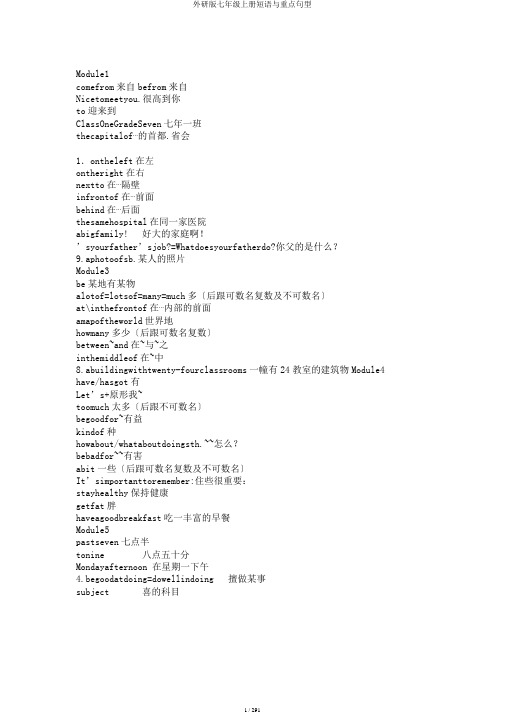
Module1comefrom来自befrom来自Nicetomeetyou.很高到你to迎来到ClassOneGradeSeven七年一班thecapitalof⋯的首都.省会1.ontheleft在左ontheright在右nextto在⋯隔壁infrontof在⋯前面behind在⋯后面thesamehospital在同一家医院abigfamily! 好大的家庭啊!’syourfather’sjob?=Whatdoesyourfatherdo?你父的是什么?9.aphotoofsb.某人的照片Module3be某地有某物alotof=lotsof=many=much多〔后跟可数名复数及不可数名〕at\inthefrontof在⋯内部的前面amapoftheworld世界地howmany多少〔后跟可数名复数〕between~and在~与~之inthemiddleof在~中8.abuildingwithtwenty-fourclassrooms一幢有24教室的建筑物Module4 have/hasgot有Let’s+原形我~toomuch太多〔后跟不可数名〕begoodfor~有益kindof种howabout/whataboutdoingsth.~~怎么?bebadfor~~有害abit一些〔后跟可数名复数及不可数名〕It’simportanttoremember:住些很重要:stayhealthy保持健康getfat胖haveagoodbreakfast吃一丰富的早餐Module5pastseven七点半tonine 八点五十分Mondayafternoon 在星期一下午4.begoodatdoing=dowellindoing 擅做某事subject 喜的科目talkwithsb=talktosb.与某人交谈onweekdays在工作日getup起床havebreakfast/havelunch/havedinner吃早餐/午餐/晚餐10.starttodo=begintodo 开始做watchTV看电视doone’shomework做作业gotobed去睡觉gotosleep去睡觉haveabreak/havearest休息片刻haveclasses/lessons上课WelcometoBeijingZoo.欢送到北京动物园。
七年级上册英语外研版重点句子

七年级上册英语外研版重点句子以下是七年级上册英语外研版的一些重点句子:1、-What's your name? -My name's ...(询问别人叫什么名字)2、-How are you? -I'm fine./I'm OK.(问候别人)3、-Nice to meet you. -Nice to meet you, too.(遇见认识的人)4、-Where are you from? -I'm from ...(询问别人来自哪里)5、-What's your favorite subject? -My favorite subject is ...(询问别人最喜欢的科目)6、-What's your favorite color? -My favorite color is ...(询问别人最喜欢的颜色)7、-What's your favorite food? -My favorite food is ...(询问别人最喜欢的食物)8、-Can you speak English? -Yes, I can./No, I can't.(询问别人是否会讲英语)9、-What day is it today? -It's ...(询问今天是星期几)10、-What's the date today? -It's ...(询问今天是几号)11、-How much is it? -It's ... yuan.(询问物品价格)12、-What time is it? -It's ... o'clock.(询问现在几点)13、-What day is it? -It's ... day.(询问今天是星期几)14、-How are you doing?(问候别人近况)15、-Please sit down./Have a seat.(请别人坐下)16、-Thank you./Thanks a lot.(感谢别人)17、-You are welcome./Not at all.(回答别人的感谢)18、-What day is it today? -It's Monday./It's a sunny day.等等。
- 1、下载文档前请自行甄别文档内容的完整性,平台不提供额外的编辑、内容补充、找答案等附加服务。
- 2、"仅部分预览"的文档,不可在线预览部分如存在完整性等问题,可反馈申请退款(可完整预览的文档不适用该条件!)。
- 3、如文档侵犯您的权益,请联系客服反馈,我们会尽快为您处理(人工客服工作时间:9:00-18:30)。
七年级上册重点短语和句子•Module 1• 1. be from. . . =come from. . .• 2. . . . years old• 3. what about. . . =how about. . . • 4. in Class Ten, Grade Seven• 5. the capital of. . .• 6. first name =given name•7. last name=family name•8. English name•9. Chinese name• 1. I’m Chinese ,and I’m from China. •(I’m Chinese, and I come from China. )• 2. Where are they from?•(=Where do they come from?) •They are from America.•(=They come from America. )• 3. How old is that man?•He is forty-four.• 4. The students are in Class Five, Grade Seven.• 5. Tom is in Class One with Lingling. •=Tom with Lingling is in Class One. •=Tom and Lingling are in Class One. • 6. What about you?=How aboutyou?=And you?•7. Welcome to Class 6 Grade 7 !•8. Beijing is the capital of China. •9. Good to see you.•=Nice to see you. = Glad to see you. •10. I’m Tony Smith. Tony is my first name and•Smith is my last name. •Module2• 1. a photo of Tony’s family• 2. on the left of. . . . .• 3. next to. . . . .• 4. in front of. . . . . .•in/at the front of. . . . . . • 5. Tony’s parents• 6. in the photo•7. at the bus station•8. at a police station•9. a manager of a theater•=a theater manager•10. a manager of a hotel•=a hotel manager•11. at/in the same hospital•12. a bus driver•13. a farm worker•14. a shop worker•15. an English teacher• 1. This is a photo of Tony’s family • 2. What a big family!• 3. My mum’s parents are on the right. • 4. The woman next to me is my dad’s sister.• 5. Is this your family?• 6. Are these your grandparents? •7. My mother is the manager of a theater.•8. My father’s job is at a police station. •9. His parents are shop workers. •Module3• 1. a lot of furniture• 2. on everyone’s desk•on the teacher’s desk• 3. on the wall• 4. at/in the front of. . . . . .• 5. a map of the world• a map of China• 6. in the dining hall•7. at the school gate•8. on/in the playground•9. a science lab•10. a sports hall•11. an office building•12. a classroom building•13. in the science building•14. five computer rooms•15. in the middle of. . . . . .•16. on the left of. . . . . .•17. between the library and the dining hall•18. be for. . . . . . .• 1. What’s your classroom like?•It’s really big.• 2. How many students are there in your class?•There are forty-four students in my class.• 3. There aren’t any computers in our classroom.• 4. Are there any computers oneveryone’s desk ?•Yes, there are some. ( No, there aren’t any. )• 5. What’s in your classroom?•There is a lot of furniture.• 6. There is a map and some pictures on the walls.•=There are some pictures and a map on the walls.•7. Gao Yan’s between Zhao feng and Li Min.•8. In the middle of the school is a big playground.•=A big playground is in the middle of the school.•9. Where is the library?•It’s next to the science lab.•III. 基本语法点:• 1. There be句型• 2. 表方位的介词短语及用法• 3. 注意There be 和have/has got 的区别• 4. 数词的表达Module 4:1. have/has got. . .• 2. healthy food and drink •unhealthy food and drink• 3. go shopping for sth. =go to buy sth • 4. too much +不可数; too many+可数• 5. be good for. . .• 6. be bad for•7. lots of. . . = a lot of. . . =many/much •8. get sth for sb=buy sth for sb •9. what kind of. . .•10. one’s favourite food and drink •11. chicken soup•12. stay healthy•13. eat well•14. have a good breakfast•15. have sth for breakfast•16. remember to do sth•17. a bit tired• 1. We’ve got lots of apples.• 2. He hasn’t got any meat.• 3. Have you got any chocolate? •Yes, we have. / No, we haven’t. • 4. Let’s go shopping for food and drink. • 5. Let’s get some coffee for your mum. • 6. Too much chocolate isn’t good for you.•7. What kind of fruit ?•8. Cola is bad for you.•9. How about some orange juice? •Good idea.•10. Is your food and drink healthy? •11. It is important to stay healthy. •12. There are lots of fruit and vegetables for lunch, but there i sn’t any cola orcandy .•13. Please remember to buy some fruit. •14. I’m a bit tired.•III. 基本语法点:• 1. have/has got 的含义及句子结构。
注意there be的区别,以及和have/has的替换。
• 2. 可数名词和不可数名词• 3. some 和any的用法Module 51. my school day• 2. on Tuesday• 3. have Chinese=have a Chinese lesson • 4. at five to nine =at eight fifty-five • 5. at half past seven =at seven thirty • 6. on Wednesday afternoon•7. be good at. . . =do well in. . .•8. talk with/to sb•9. on weekdays=on the weekday• 1. go to school• 2. go home• 3. have a healthy breakfast• 4. go swimming• 5. play football• 6. play with sb•7. make apple juice•8. in the kitchen•9. do sports•10. want to do sth•10. on weekends=on the weekend •11. get up•12. have breakfast•13. be next to. . . .•14. start work=start lessons•15. have a break (for twenty minutes) •16. go to the playground•17. watch TV•18. have dinner with sb•19. do one’s h omework•20. do one’s maths homework •21. go to bed •22. go to sleep•23. wash one’s face•24. make sb/sth +形容词•25. have a busy day•26. after school• 1. What’s the time?=What time is it?•It’s twenty past one. =It’s one twenty. • 2. What are our lessons on Monday? •=What lessons do we have on Monday? • 3. We have Chinese at 8:00 and science at 8:55.• 4. It’s interesting to study maths .• 5. I like the lessons on Tuesdayafternoon.• 6. They don’t have geography on Friday.•7. Do you have PE on Thursdayafternoon?•8. I love history and I’m good at it. •9. My favourite subject is English . •10. I can talk with my Chinese friends. •11. Maths is difficult for Betty.•=It’s difficult for Betty to study maths.•12. What time is your art lesson?•I have art at 3:00pm on Wednesday. •13. We start work at nine o’clock. •14. My school is next to my home. •15. We have a break for thirty minutes. •16. We have lunch in the dining hall at 12:20.•17. I have a busy day on Saturday. •18. The students have eight lessons every day.•19. Mr. Li makes maths lessonsinteresting.•20. I do my maths homework first after school•III. 基本语法点:• 1. 时间的表达及提问 2. 一般现在时Revision A: 1. go to school• 2. go home• 3. have a healthy breakfast• 4. go swimming• 5. play football• 6. play with sb•7. make apple juice•8. in the kitchen•9. do sports•10. want to do sth• 1. My favourite day of the week is Saturday.• 2. I go to the library and read my favourite book.• 3. I read stories to my old friend . • 4. I can make afternoon tea for you • 5. I do sports with my friends in the afternoon.• 6. Daming lives with his grandparents. •7. I eat healthy food for lunch. •8. What for?=Why?•9. I want to make apple juice for you.Module 61. a trip to the zoo• 2. welcome to. . .• 3. many kinds of. . .• 4. such as. . .• 5. different countries• 6. look at. . . .•7. lingling the panda•8. the black and white animal •9. live in Africa•10. a little fruit•11. 30 kilos of bamboo a day •12. as well as. . .•13. the favourite of people•=people’s favourite•14. all over the world •15. an African animal•16. live alone•17. be good at swimming•18. catch other animals for food •19. the world of animals• 1. Welcome to Beijing Zoo.• 2. The zoo has many kinds of animals. •=There are kinds of animals in the zoo. • 3. The animals come from different countries and•eat different food.• 4. They also like plants.• 5. Do pandas eat plants and leaves? •Sure. They love bamboo.• 6. Shall we go and see pandas? •Yes. Let’s go.•7. Which is Lingling the panda ? •8. There is a panda called Lingling. •9. A panda doesn’t eat meat .•10. The tiger lives in Asia.•=The tiger comes from Asia. •11. A panda eats about 30 kilos of bamboo a day.•12. They eat bamboo, as well as plants and leaves.•13. A panda is the favourite of people all over the world.•14. The zebra is an African animal. •= The zebra comes from Africa. •15. The tiger likes living alone, and it is good at swimming .•16. The bear often catches many kinds of animals for food ,such as goats and fish. Module 71. connect A to B• 2. turn on / off. . .•turn up / down. . . .• 3. write sth on the computer• 4. open a new document• 5. click the mouse on. . . . . .• 6. in the new document•7. save the document•8. write a name for the document •9. visit sb•10. print the document•11. put some paper in the printer •12. on Sundays•13. share sth with sb•14. in/at my home•15. a manager of a company•16. go on the Internet•17. check the times of trains•18. make travel plans 19. listen to music20. watch movies•21. every Friday night•22. search for some information about. . . •23. check one’s email•24. talk to sb on the Internet•25. send emails to sb•26. play computer games•27. work for a company•28. at/in the cinema•29. buy train tickets•30. remember to do sth•31. play music•32. plan for our holiday•33. use A to do B• 1. How do I do my homework on the computer?• 2. What’s next?• 3. Please connect the screen to the computer.• 4. Finally, turn on the computer.• 5. I want to learn how to print adocument.• 6. My father often talks to his customers on the computer.•7. I also go on the Internet to check my emails.•8. I listen to music or watch movies on the computer every Friday night . •9. There is no computer in my home. •10. I play a lot of games and my motherdoesn’t like it.•III. 基本语法点:• 1. 一般现在时的特殊疑问句。
